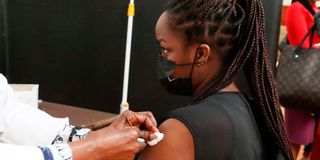UK: Fully vaccinated travellers from Kenya will no longer have to quarantine

A woman receives a Johnson & Johnson Covid-19 vaccine at the Milimani Law Courts on September 13, 2021.
What you need to know:
- Travellers will have to be vaccinated from a list of jabs approved by the UK to enjoy the privilege.
- British High Commission said the decision was reached after talks between experts from both sides.
The British Government on Thursday announced that Kenyans travelling to the United Kingdom will no longer need to quarantine or present a negative Covid-19 test, if fully vaccinated.
The decision, which takes effect on Monday, October 11, will come as relief following months of refusal by UK authorities to recognise Kenyan vaccine certificates.
A spokesperson from the British High Commission in Kenya said that fully vaccinated Kenyans will no longer have to quarantine or present proof of a negative test on arriving in the UK as has been the rule and that Covid-19 vaccine certificates from Kenya will now be recognised in the UK.
“Thanks to our strong partnership with the Ministry of Health, we have completed the process to recognise vaccine certificates from Kenya,” the spokesman said.
“This is great news for our peoples, Kenya-UK trade, and the tourism sector as we move closer to getting back to normal. The full guidance on entry requirements can be found here: https://www.gov.uk/guidance/travel-to-england-from-another-country-during-coronavirus-covid-19#if-you-are-fully-vaccinated,” said the official.
The decision could end a long tussle between authorities in Nairobi and London over the nature and features of certification for those who have received Covid-19 jabs.
Vaccination programmes
But travellers will have to be vaccinated from a list of jabs approved by the UK to enjoy the privilege. These include Pfizer, Moderna, AstraZeneca.
The UK Mission said the decision was reached after talks between experts from both sides, although the UK also included several other countries whose exclusion had caused an uproar across the world.
“I’m delighted people vaccinated in Kenya will be able to travel to the UK without quarantine, or taking a Covid-19 test before departure. This is excellent news for our peoples, businesses, and tourism after a tough 18 months,” Jane Marriott, the British High Commissioner to Kenya, said.
UK’s Transport Secretary Grant Shapps added 37 new countries to the list of those whose vaccination programmes his government now recognises.
Their exclusion had been criticised as discriminatory as it includes countries as diverse as India, Brazil and South Africa. All these will now have their vaccination certificates recognised in the UK from Monday.
In Africa, Nigeria, Egypt, Ghana, Namibia and Morocco will also be recognised.
The United Kingdom began adopting a new system of admittance for international travellers on October 4, opting to allow in fully vaccinated foreign travellers as opposed to those who test negative.
Vaccine donations
Unvaccinated travellers from these countries may still enter the UK, but as long as they undergo quarantine and take tests.
In a list publicised on Monday night, the UK government said only people vaccinated with adequate doses of Pfizer, AstraZeneca, Moderna and John & Johnson (Janssen) will be considered inoculated, as long as they come from a region whose vaccination programme is approved by the UK.
The initial list of 70 countries had excluded the entire African continent, where the UK has incidentally has donated vaccines and provided other logistical support through the Covax programme.
“You must be able to prove that you’ve been fully vaccinated under a vaccination programme with approved proof of certification,” says a notice from the UK’s Department of Transport.
“To qualify under the fully vaccinated rules for travel to England, you must have been fully vaccinated with a full course of an approved vaccine in the UK or one of the countries and territories listed below.”
The AU had criticised the move as one that could raise vaccine hesitancy in Africa.





